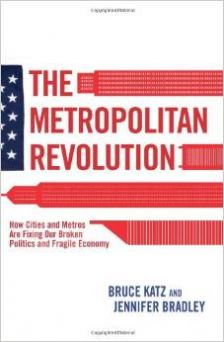The Metropolitan Revolution: How Cities and Metros Are Fixing Our Broken Politics and Fragile Economy

Metropolitan areas in the United States are able to generate innovations and be engines of economic prosperity and social transformation. How metropolitan revolutions have been happening in recent decades, what the key ingredients for positive large-scale changes are and what opportunities they offer for the United States to revive its national economy, international trade, and civic society are the central topics of this book.
The authors frame this book as a manifesto for change and action in order to fully realize the potential of cities and metropolitan areas to drive change in a reasoned, pragmatic and visionary way and to invert the hierarchy of power that has so far been present in the United States.
The first part describes and analyses four cases of metropolitan revolutions in New York, Denver, Northeast Ohio and Houston. For example, the revolution of Denver is highlighting the power of mayors, people’s votes and strategies of collaboration to transform the identity from a city and its backyards, towards a metropolitan region that realizes its potential. It highlights how big civic infrastructure projects (airport, cultural amenities) can benefit from collaboration on a metropolitan scale, once all actors (private, public, civic society) develop a mutually appreciative and supportive way to govern and implement projects.
The second part of the book asks how metropolitan revolutions can be achieved and governed in the future, given that the examples cannot provide blueprints. But the metropolitan regions and innovative solutions share characteristics from which to learn. The ongoing transformation of Detroit, for example, can be seen as a closely monitored living urban laboratory for civic engagement, networked leadership and a re-evaluation of assets. Also, the authors stress the need for US metropolitan areas to look beyond national borders and engage in global networks of trading cities. This also requires a cultural shift towards stronger geographical knowledge, foreign language skills and recognition of the benefits of increasing exports. Additionally, within nations, the authors emphasize that cities and metropolitan areas need to be appreciated as actors rather than subjects, and this requires a new understanding and distribution of power.
In sum, readers will find an optimistic book that displays how the American pragmatism and a problem-solving attitude create a space for shifting powers in the country, so that citizens can have an active role in leading communities and metropolitan areas towards a more positive and prosperous future.
Book note prepared by Julia Wesely
Search the Book notes database
Our Book notes database contains details and summaries of all the publications included in Book notes since 1993 - with details on how to obtain/download.
Use the search form above, or visit the Book notes landing page for more options and latest content.
For a searchable database for papers in Environment and Urbanization, go to http://eau.sagepub.com/

